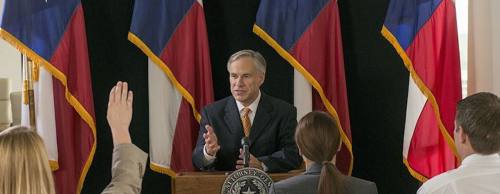On Jan. 31, just under four months ago, Gov. Greg Abbott addressed the Senate and House to declare his agenda of emergency items. These items, his most important priorities, had the expedited permission to surpass any legislative blockades that stood in the way of the 6,631 House and Senate bills filed and be passed as soon as possible.
As of Wednesday morning, seven total bills had been given approval by both chambers and signed into law by the governor. Only one of those seven could reasonably fall into the category of the governor's emergency items.
With just 13 days remaining in the regular session, and Lt. Gov. Dan Patrick threatening to call for a special session should his pet bills not be passed out of the House in a press conference Wednesday morning, the Legislature's complexities continue.
Here is a breakdown of each of the bills Abbott put pen to in the first Texas law signings of 2017.
1. Senate Bill 4: The bill would allow law-enforcement officers to question the immigration status of individuals through legal detention or arrests. This means if a person is stopped for a broken tail light or speeding ticket, for example, an officer could detain him or her for U.S. Immigration and Customs Enforcement if questions arise about immigration status.
The bill also prevents any local law-enforcement agencies from having a policy on record preventing this process and prohibits agencies from declining what are currently optional ICE detainer requests. Chiefs of noncompliant agencies face criminal penalties, and the agencies themselves face civil charges.
This law will be effective Sept. 1.
2. Senate Bill 347: The bill applies state open meetings law and public information law to any regional water planning group and its committee or subcommittee. This law will be effective Sept. 1.
3. Senate Bill 492: The bill authorizes private collection agencies to collect dishonored checks and credit card invoices received by the county tax assessor-collector. Prior to the signing of the bill, only law-enforcement agencies could do this. This law is effective immediately.
4. Senate Bill 550: Certain entities that incur a premium tax have previously not been allowed to claim franchise tax credits for the rehabilitation of certified historic structures. This bill fixes that and is effective immediately.
5. Senate Bill 843: The bill prohibits the information of crime victims participating in the crime victims' compensation program from being released or disclosed, except in limited circumstances. Should the attorney general need to release some of the victim's information, he or she must first redact confidential information. The bill is effective Sept. 1.
6. Senate Bill 988: The bill changes local government code to change the county judge from being the presiding officer of a county commissioners court meeting if the meeting is held by video conference call and the county judge is not located at the physical space available to the public for the meeting. The bill is effective immediately.
7. Senate Bill 1120: Political subdivisions are currently prohibited from imposing additional taxes on gasoline, diesel fuel and liquefied gas. This bill extends that prohibition to liquefied natural gas and compressed natural gas. The bill is effective immediately.
As more bills begin to pass and make it to the governor's desk, Abbott has the potential to exercise his veto power.
Once a piece of legislation gets to Abbott's desk, he has 10 days to sign or veto it, and if he does nothing, it automatically becomes law. Abbott also has line-item veto power within the state budget. In 2015, Abbott vetoed 44 total bills.
Should there be unresolved issues within the Legislature, a special session can be called. Only Abbott can do this and only in 30-day increments for specific issues. There is no limit to how many special sessions can be called; in 2003, Gov. Rick Perry called three consecutive sessions on the topic of redistricting.
Select your community
Support Us
News
- Austin Metro
-
Houston Metro
- Houston Metro Home
- Bay Area
- Bellaire | Meyerland | West University
- Conroe | Montgomery
- Cy-Fair | Jersey Village
- Cypress
- Heights | River Oaks | Montrose
- Katy | Fulshear
- Lake Houston | Humble | Kingwood
- New Caney | Porter
- Pearland | Friendswood | Manvel
- Spring | Klein
- Sugar Land | Missouri City
- The Woodlands
- Tomball | Magnolia
- Dallas | Fort Worth Metro
- San Antonio Metro




